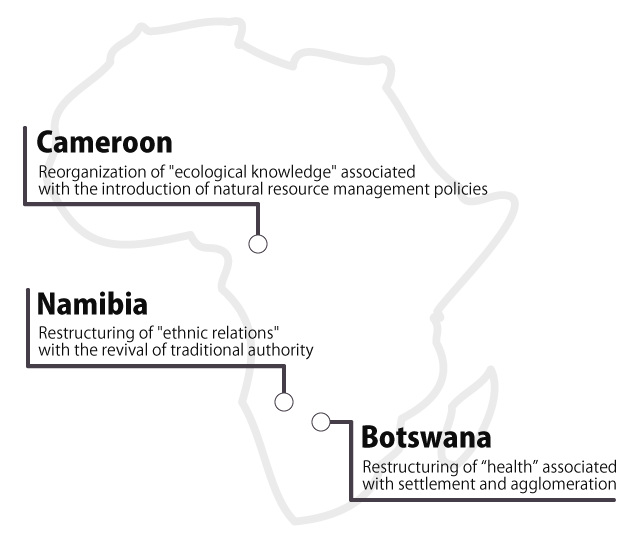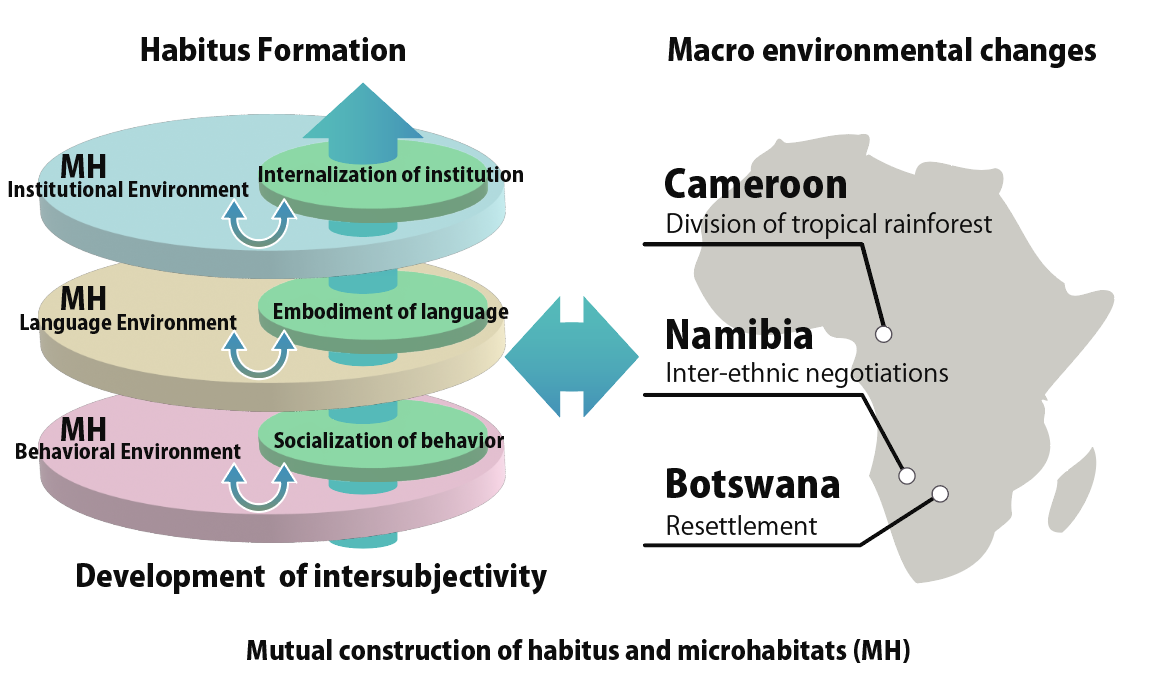Research Program
Research Summary
Ecological Future making of Childrearing in contact zones between hunter-gatherers and agro-pastoralists in Africa
In this study, we collected and analyzed data on caregiver-child (birth to 5 years old) interactions in three regions that have served as contact zones between hunter-gatherers and agro-pastoralists in Africa (Botswana, Namibia, and Cameroon). We will clarify the processes of socialization of behavior, embodiment of language, and internalization of institutions, as well as the processes of reorganization of behavioral, linguistic, and institutional environments that accompany these processes. Furthermore, based on the results of these analyses, we will support children who are socializing in an ever-changing society to mutually construct new microhabitats and habitus for a better future.
In the main research area, the following issues will be specifically addressed

Purpose
Based on previous research (e.g., Takada 2020), this study aims to examine the connections between the subject, others, culture, and environment in the early years of life (0-5 years old) through Caregiver-Child Interaction (CCI), which is the process by which habitus and microhabitats (structured places that enable interactions; Ochs et al. 2005) are mutually constructed.
Infants form habitus by developing intersubjectivity. In this process, they socialize their innate behaviors to suit their culture (socialization of behavior), internalize and master the language spoken by others (embodiment of language), and internalize external institutions to discipline themselves and society (internalization of institutions).

The corresponding behavioral, linguistic, and institutional environments constitute microhabitats. Habitus and microhabitats interact in a cyclical manner, which is reorganized when macro environmental changes occur.
Following that model, this study will conduct action research in Botswana, Namibia, and Cameroon as the main research areas. The aim is to understand the link between social change and socialization in theory, and in practice, to support the mutual construction of habitus and microhabitat for a better future for children who are being socialized.
The three regions were selected for the following reasons
- Africa is expected to undergo the greatest social changes of all the continents in the coming decades and is important for a global future building.
- The three regions cover a wide range of climatic environments: desert-steppe (Botswana), steppe-savanna (Namibia), and savanna-tropical rainforest (Cameroon).
- All three regions are contact zones between hunter-gatherers and agro-pastoralists (Pratt 2007), which is important for discussing the negotiation, integration and development of diverse natural views, livelihoods and cultures (e.g. Descola 2005).
- In all three areas, social relationships between the representatives and the various actors involved in CCI (e.g., traditional authorities, government agencies, NGOs, hospitals, and local research institutions), which are necessary for the promotion of this study, were established in the course of the ongoing research by the representatives, facilitating an understanding of the social situation and a medium- to long-term perspective on these issues.
Contents of this Program
Research Themes
Theme1: Socialization of behavior and reorganization of the behavioral environment
Caregivers intersubjectively regulate the regularity of children’s behavior from birth (Malloch & Trevarthen 2009) and socialize their behavior. In the process, children acquire behaviors that reflect the history and culture of their society, while at the same time updating and revising their historical-cultural framework.
Theme2: Embodiment of language and restructuring of language environment
Children embody historically and culturally constructed language using a variety of semiotic resources (Goodwin 2000), and as they become familiar with the various levels of language structure, they generate new knowledge and modify that structure.
Theme3: Internalization of institution and restructuring of institutional environment
Children internalize historically and culturally shaped institutions by being respected by others, but when they do not receive appropriate respect, they attempt to change the institutions themselves through the struggle for recognition (Honneth 1996).
Furthermore, based on our understanding of the above three themes and their interaction, we support the mutual construction of new microhabitats and habitus for a better future for children in an ever-changing society.
Research Areas and Research Questions
Botswana: Reorganization of “Health” in the context of settlement and agglomeration (Resettlement)
In Botswana, we will focus on the reorganization of health-related CCI due to the resettlement of the G|ui and Gǁana, who for many years led a hunter-gatherer lifestyle in the Kalahari Desert. Botswana has a history of overcoming the HIV epidemic and now, like Japan, is confronting the corona disaster. In collaboration with University of Botswana, which has a MoU and student exchange agreement with Kyoto University, the project will promote action research on child health promotion. Specifically, regarding the socialization of behavior, we will analyze the transformation of children’s hygiene behavior in the settlement following the construction of additional latrines. Regarding the embodiment of language, we will implement health education using storytelling and examine its effectiveness. Regarding the internalization of institution, we will clarify the generational differences in health concepts that occurred with the introduction of modernization policies.
Namibia: Restructuring of “Inter-ethnic Relations” with the revival of traditional authority (Inter-ethnic negotiations)
In Namibia, the !Xun and ǂAkhoe, regional minorities and hunter-gatherers, and the Owambo, majority agro-pastoralists, have been negotiating for centuries. We will focus on how this relationship has been restructured since Namibia’s independence in 1990. Therefore, we will conduct action research with graduate students from the University of Namibia and Kyoto University, where co-tutelle is promoted, to facilitate inter-ethnic exchange among children. On the behavioral aspect, we will identify changes in children’s eating habits due to the promotion of agricultural practices and weaning foods. On the language aspect, we will analyze the practices of multilingualism in early childhood education, which is aimed at reconciliation among ethnic groups. On the institutional aspect, we will discuss the reorganization of children’s identities in line with the revitalization of traditional culture.
Cameroon: Restructuring of “Ecological Knowledge” with the introduction of natural resource management policies (Division of tropical rainforest)
In Cameroon, we will focus on how Baka hunter-gatherer are reorganizing their ecological knowledge (EK) following the division of the rainforest into national parks and commercial logging areas. In the area, there is a field station (FS) of Kyoto University, which has resumed dispatching researchers. This project will also use the FS as a base to conduct action research to revitalize children’s acquisition of EK. On the behavioral aspect, we will implement temporary childcare during women’s subsistence activities and clarify the effects on multiple-child care, which has been the focus of many researchers on child-rearing and attachment. On the language aspect, we will conduct classes on traditional knowledge for caregivers and clarify its impact on children’s acquisition of EK. On the institutional aspect, we will discuss the impact of the introduction of welfare policies on traditional child care and care for children with disabilities.
Overall
Furthermore, synthesizing these three cases, we will discuss the process of reorganization of the behavioral, language, and institutional environments in response to macro environmental changes, and the general characteristics of the process by which young children develop intersubjectivity through socialization of behavior, embodiment of language, and internalization of institution.
Expected Results and Significance
- Overcome the weaknesses of developmental research based on methodological individualism through a microscopic analysis of CCI. Elucidate the interdependence of the developmental process of culturally mediated intersubjectivity and the process of modification of cultural frameworks and environments through action.
- The communication research of the principal investigators has been integrated and developed from an ecological perspective to comprehensively theorize the origins of sociality. And we will develop and establish an academic field that bridges anthropology, psychology, linguistics, sociology, economics, and other fields.
- To help build a better future by presenting creative options for resolving social conflicts associated with macro-environmental changes in the three regions. We will study with African societies that have faced various difficulties from early on, but are still growing rapidly.
